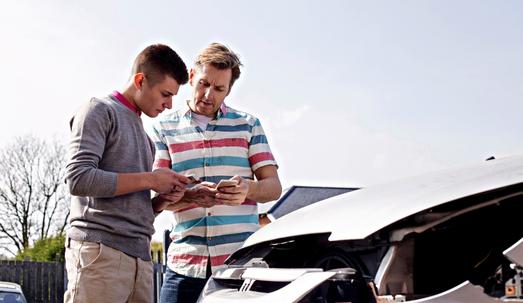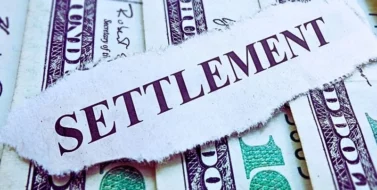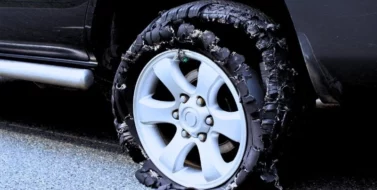When you go to court for a car accident, you can recover damages to compensate you for your injuries and the impact the accident had on your life. These damages are recovered against the at-fault party, who is represented as the defendant in your lawsuit. While in court, your attorney will present evidence to support your claim, including photos of the accident, witness testimony, and other pieces of information that prove fault.

Once your attorney, and the defendant’s attorney, have presented the case to the court, a judge or jury will deliberate. In some cases, you may be offered a settlement by the at-fault party. In others, the judge will have to determine a fair settlement award.
Table of Contents
Who Can File a Car Accident Lawsuit?
If the accident is clearly the fault of the other driver, or if you strongly believe that to be the case, you can sue an insurance company after a car accident to receive compensation for the damages you sustained. If you do decide to file a car accident claim or lawsuit, you’ll need to make sure you have a strong advocate in your corner for the process. The insurance company will certainly be well represented. Deciding to hire a car accident injury lawyer will need to happen sooner, rather than later so that he or she can start to collect evidence immediately.
Your attorney will need to get the evidence collection process started right away so that video footage of the accident, for example, isn’t overwritten or erased, as is common after a certain period of time for most surveillance cameras. You also want to get witness statements collected before the accuracy of their memories begins to fade.
What to Expect When You Go to Court for a Car Accident
Chicago car accident attorneys are likely going to attempt to reach a settlement with the insurance company before going to court. The majority of car accident lawsuits are settled out of court. However, if the insurance company refuses to offer a reasonable settlement, or if they have decided to argue fault for the accident, you could find yourself going to court.
Appearing in court for an accident doesn’t need to be intimidating. Your attorney will have you well-prepared before the day of your first hearing, and will likely have hired expert witnesses to back you up and help prove the facts of your case to the jury. While you can choose to have your case heard by a judge in Chicago, most car accident lawyers will recommend a jury trial.
The car accident court process is similar to any other civil suit. At this point, you’ll have already been through filing the complaint, the defendant’s answer, any required depositions, and all pre-trial motions and conferences. The trial process is can be summarized by the following:
- Voir Dire
- Opening Statements
- Presentation of Evidence
- Closing Arguments
- Jury Deliberation
Voir Dire
This is the process of selecting the twelve jurors who will be hearing your case and deciding fault and, if the defendant is decided to be at fault, the number of damages you are to be awarded. Both your attorney and the insurance company’s attorney will be allowed to ask questions of potential jurors and exclude certain people from the jury.
Opening Statements
During this phase, your attorney will let the jury know what they can expect from the case. The defendant’s attorney will then tell the jury how they plan to prove your arguments false.
Presentation of Evidence
This will be the point in the case where your car accident attorney presents the evidence he or she has gathered proving fault and enumeration of the damages you’ve incurred. He or she will often use expert witnesses in this portion of the trial.
The insurance company’s attorneys will be allowed to cross-examine each of your witnesses, and, after your attorney’s rest, they will be allowed to call their own witnesses to attempt to refute your evidence or conclusions. Then, your lawyer will be allowed to cross-examine the witnesses for the defense in the same manner.
Closing Arguments
This part of the process is where each attorney gets to reiterate to the jury his or her position, and how the evidence presented supports his or her position about the fault of the accident and the amount of damages incurred by the plaintiff.
Jury Deliberation
During jury deliberation, the members of the jury will review the case and all the evidence presented to them. They will determine whether the defendant is at fault in the accident, in their opinion. If they do decide that the defendant was at fault, they will determine the amount of damages that should be awarded to you in compensation.
What Car Accident Damages Can You Recover?
If the jury finds it in your favor during deliberations, you can likely expect to recover one or more categories of damages. You can possibly recover medical expenses related to the accident. Both past and potential future medical expenses can be included in this number. You also can expect to recover lost income from work time missed due to the accident and your injuries. It is possible to recover damages for income limitations in the future if the accident left you with any sort of diminished capacity. Finally, you may be able to recover damages for pain and suffering, and any damages related to the repair or replacement of your vehicle.
If the insurance company finds the jury’s decision of fault or the amount of damages awarded to be excessive, they may attempt to find an error made by the court during the trial to find grounds for filing an appeal. Don’t be surprised if an appeal is filed soon after a verdict in your favor. Ask your attorney to educate you on the appeals process. Likely, an appeals court will not uphold an appeal for the amount awarded.





